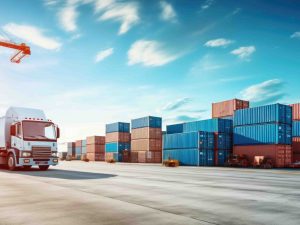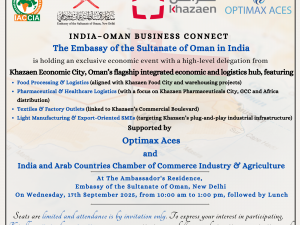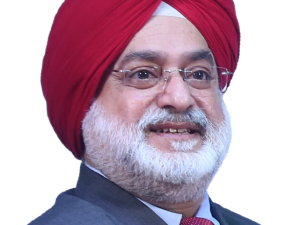To accelerate industrial growth and upgrade urban infrastructure, Maharashtra Chief Minister, Devendra Fadnavis has announced plans to establish a dedicated logistics hub in Dhule. The announcement was made during a high-level meeting in Mumbai focused on development priorities for the Dhule City assembly constituency, according to a post on Fadnavis’ official X handle. He directed officials to evaluate the proposed hub’s technical, financial, and logistical feasibility, guided by expert recommendations. To mitigate seasonal flooding, particularly in low-lying zones, he called for coordinated action by the disaster management department. Fadnavis also urged the expedited implementation of solar power projects with battery storage to reduce municipal costs associated with water supply and street lighting.
Read More »India-Oman meet to unlock trade & investment opportunities
Rajesh Lal, Co-founder, Optimax Aces and Treasurer, Warehousing Association of India (WAI) shares, “Considering the current geoeconomic situation, Oman merits serious consideration from logistics perspective with its strategic location which supports lower logistic cost and dependable supply, key considerations to accessing global markets. Oman Vision 2040 launched in January 2021 by order of His Majesty the Sultan strategically repositions the national competitiveness around six themes one of which is ‘world class infrastructure and transport services.’ “Oman today has emerged as an attractive destination with favourable investment climate, characterised by a stable political environment, world-class infrastructure (such as 5 modern airports, 4 world class sea ports, nation wide fibre optic connectively growing coastal ferry and shipping services), full foreign ownership in many sectors, one-stop shop portal InvestEasy for clearances, no restriction on capital and profit repatriation, regionally competitive costs, ready supply of raw materials (oil, gas, minerals, metals, other natural resources) 100 per cent population as urban with median age of 29.2 years (2023), wide use of English language as accredited one and a supportive government. Its strategic geographic location serves as a gateway between East and West offering immense potential for transshipment and trade. Oman is well connected with a 3 hours flight from 30 per cent of the world’s population. It is ranked as one of the safest countries in the world. While India-Oman FTA is nearing conclusion, there are other agreements which make it an attractive investment location for setting up business. Illustratively, GCC-European Free Trade Association FTA with Iceland, Liechtenstein, Norway & Switzerland for goods & services covering industrial goods exemption from customs duties. “A case to point is Khazaen Economic City, located just 60 kms from …
Read More »‘Prioritise skill development to stay competitive in logistics’
Balagopal Balachandran, National Head- Air Freight, FEI Cargo said, “According to a report of National Skill Development Corporation (NSDC) 2024, the demand for skilled labour in India has reached approximately 103 million workers, however the supply fell short by 29 million workers This shortfall affects various sectors including logistics. The logistics sector faces significant knowledge gaps and skill shortages, this knowledge gap can lead to inefficient use of technology, difficulty in adapting to change and a shortage of tech savvy professionals. We need to move away from the mindset of ‘we move goods, not graph.’ The gap is not just about skills it is about mindset and exposure. By bridging the knowledge gap, logistics organisations can unlock the full potential of emerging technologies, improve efficiency, and stay competitive in the industry. It is time for the logistics sector to prioritise skill development and stay ahead of the curve.”
Read More »‘High-cost investment is a barrier for MSMEs as they might not have sufficient funds’
Gautham Raju, Senior Manager – Global Air Freight and Head of Air Freight at WIZ said, “We can say that it is not entirely due to knowledge gaps and skill shortages even though we are lacking behind when compared to other sectors. Govt is implementing new policies in place such as NLP and also FTA’s like recently with UK to boost MSME business which will indirectly empower them to implement emerging technologies. The main barrier which we see with MSME’s on adapting to the advanced technologies like AI, IoT and Blockchain is high-cost investment as they might not have sufficient allocations on their annual budget to implement these and maintaining it. Meanwhile the integration of data from the existing systems might be also another challenge which may also end up in data privacy issues. Moreover, they are already comfortable with the process they are currently with, and it might take some time at their level to switch with high end tech savvy apps.
Read More »‘Many players encounter regulatory uncertainty & fear of operational disruptions during tech transition’
Vipin Vohra, Chairman, Continental Carriers said, “There is a clear gap in digital literacy within MSMEs. Limited in-house expertise to evaluate, implement, or manage advanced technologies, coupled with a shortage of industry-specific training programs, constrains their ability to adopt and scale modern digital solutions effectively. MSMEs in logistics and air cargo face hurdles like fragmented digital infrastructure, lack of standardised processes and limited integration across supply chain systems. Many small players also encounter regulatory uncertainty and fear of operational disruptions during technology transitions. Resistance to change among traditional stakeholders further slows adoption. High initial investment costs for AI, IoT, or blockchain—covering infrastructure, software and training—make MSMEs cautious. With tight margins, these companies seek quick returns, but the longer payback period for technology investments often deters decision-making, especially without clear visibility on tangible benefits.
Read More »‘MSMEs fear high upfront investment without immediate ROI’
Amit Maheshwari, Founder and CEO at Softlink Global asserted, “Despite the growing buzz around AI, IoT and blockchain, the logistics sector—especially MSMEs—remains cautious in embracing these technologies. The biggest barrier is not just cost, but perceived cost. MSMEs fear high upfront investment without immediate ROI, often overlooking long-term gains like process efficiency, visibility, or data-driven decision-making. The fragmented nature of the industry and legacy mindset further slow adoption. Many still use disconnected systems for operations, billing, and compliance—leading to revenue leakage and inefficiencies. There’s also a notable knowledge and skill gap. Owners and mid-level managers often lack exposure to emerging tech, and there’s a shortage of trained talent to implement and manage these solutions. As a result, technology is seen as a disruption rather than an enabler. What’s needed is not just affordable, scalable platforms, but also ecosystem-driven handholding—demos, training, and real-world success stories—to make MSMEs confident that embracing technology won’t break their business, but build it.”
Read More »‘Many MSMEs lack expertise to evaluate or operate advanced technologies’
Parvinder Singh, MD, Hans Infomatic said, “A significant knowledge gap exists. Many MSMEs lack the expertise to evaluate or operate advanced systems effectively, which can lead to underutilisation or fear of adoption. We bridge this gap through dedicated training, support and by designing intuitive interfaces that do not require deep technical skills—helping customers unlock the full potential of digital transformation. The logistics and MSME sector is gradually realizing the benefits of advanced technologies like AI, IoT, and blockchain, but adoption remains cautious due to several barriers. High initial investment, uncertainty over tangible ROI, and integration challenges with legacy systems deter many players. MSMEs, in particular, operate on tight margins and often view technology as a cost rather than a strategic enabler. At Hans Infomatic, we simplify this journey by offering various modular and user-friendly solutions, which require minimal disruption and deliver measurable gains quickly. Our pricing models are also flexible to make it a variable cost model so as to allow the MSMEs to identify the gains within least operational expenses.”
Read More »AIIMS seeks space for logistics hub near Safdarjung Airport
To address the shortage of space for stores and logistics, the All India Institute of Medical Sciences (AIIMS) is reportedly looking out for space near Safdarjung airport to establish a centralised logistics hub that will be connected to the airport. “It is noted that at AIIMS New Delhi, there is an acute shortage of space for stores & logistics. As an interim measure, a few vacant houses had been allotted for such use cases. However, as these houses are being allotted and renovated for new occupants, there is a felt need for additional space in close proximity to AIIMS for establishing a logistics hub,” the order copy read. “There is a probability of a land parcel being available near Safdarjung Airport on which AIIMS can establish a logistics hub,” added reports.
Read More »Sustainable warehousing to expand by 270 mn sq. ft by 2030: JLL
According to JLL’s latest report titled ‘India’s sustainable warehousing landscape: A green print,’ the green warehousing sector in India is poised for exponential growth, with certified sustainable warehouse space expected to expand from current levels to approximately 270 million sq. ft by 2030. “In just five years India has witnessed a remarkable transformation in its warehousing landscape. Since 2019, Grade A warehousing stock across India’s major cities has expanded dramatically, growing 2.5 times from 88 million sq. ft to an impressive 238 million sq. ft by 2024. This growth reflects the increasing demand for high-quality storage and distribution facilities as India’s economy modernizes, and e-commerce continues its rapid expansion. More striking is the rise of institutional-grade warehousing space, which has tripled from 28 million sq-ft in 2019 to 90 million sq-ft by end of 2024. This surge demonstrates the growing confidence of major global investors who are bringing international sustainability standards to the Indian market,” the report added.
Read More »‘PLI scheme, Make in India have incentivized domestic manufacturing & FDI’
Ramanathan Rajamani, CEO, AISATS said, “The China+1 strategy, often interpreted as a diversification effort by global firms, should not be viewed as a shift away from China, but rather as an opportunity for other economies like India to complement global supply chain networks and meet the rising demand more collaboratively. In this evolving landscape, India has emerged as a natural partner due to its strong manufacturing capabilities, robust policy support, and improving logistics infrastructure. India’s large, skilled labour force offers cost-effective solutions across multiple sectors, making it an attractive choice for both existing and emerging supply needs. Policy reforms such as the Production-Linked Incentive (PLI) scheme and the Make in India initiative have further incentivized domestic manufacturing and foreign investment, particularly in areas of electronics, pharmaceuticals, and textiles. Geographically, India enjoys a strategic location with proximity to key Asian, African, and European markets, enabling smoother access to global trade routes. Its continued focus on infrastructure development, such as dedicated freight corridors, multimodal logistics parks, and port modernization, positions India as a reliable and resilient supply chain node. India’s participation in the “+1” strategy signals a shared role in building a more agile and diversified global supply chain, capable of absorbing shocks and responding to shifting geopolitical and economic priorities.”
Read More » Cargo Breaking News
Cargo Breaking News









